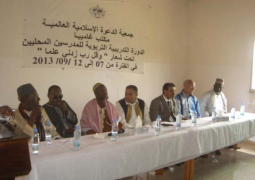It
is an indisputable fact that African countries do not trade enough among
themselves. To make any meaningful headway and register economic growth,
countries within the continent must boost intra-regional trade. This will also
help accelerate economic growth and development on the continent.
The
government of The Gambia through the Ministry of Trade, Industry, Regional
Integration and Employment in collaboration with partners has been spearheading
initiatives geared towards promoting trade within our continent.
Regional
trade integration has long been a strategic objective for Africa with some
success in eliminating tariffs within regional communities. However, more still
needs to be done.
The
signing of the African Continental Free Trade Area (AfCFTA) Agreement by the
overwhelming majority of African countries is a historic step towards
rationalising Africa’s regional trade arrangements, deepen economic integration
and draw on economies of scale and development of regional value chains. These
many believe, would further accelerate the process of structural transformation
of African economies. As a flagship project of the African Union Agenda 2063:
The Africa We Want, the AfCFTA seeks to bring on board all the 55 African
countries with a combined population of more than 1.2 billion people and a
combined gross domestic product (GDP) exceeding US$2.5 trillion, making the
continent the largest free trade area created since the formation of the World
Trade Organisation (WTO).
Analyst
believe that Africa could double intra-regional trade by easing non-tariff
barriers, including customs procedures and improving the continent’s poor
transport infrastructure; that doing this will help boost economic growth.
There
needs to be smooth running and easy flow of goods and services to make this a
reality. Wasting time especially for those on business trips within the
continent wouldn’t take us anywhere. These among many other issues are some of
the challenges hindering the development and growth of business on the
continent.
It
is envisaged that Africa continental free trade area will undoubtedly
accelerate intra-African trade and boost Africa’s trading position in the
global market by strengthening Africa’s common voice and policy in global trade
negotiations.
For
instance, the East African Community has done a lot to foster trade across the
bloc. The number of non-tariff barriers (NTBs) has been reduced to just a
handful and traders can also now clear merchandise once, at the point of entry.
There are now very few roadblocks and
weighbridges across the bloc.
Therefore,
to further enhance trade in the region, African countries should make targeted
investments and policy reforms to help eliminate the remaining trade barriers.
Already, Rwanda has announced it will undertake more business reforms.
‘‘Intra-
Africa trade remains low compared
to other regions.
Investment
in regional transport
infrastructure and ports, is necessary.’’
AFDB




